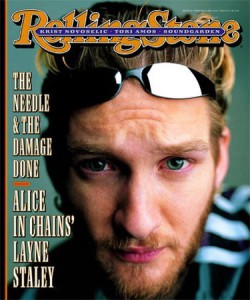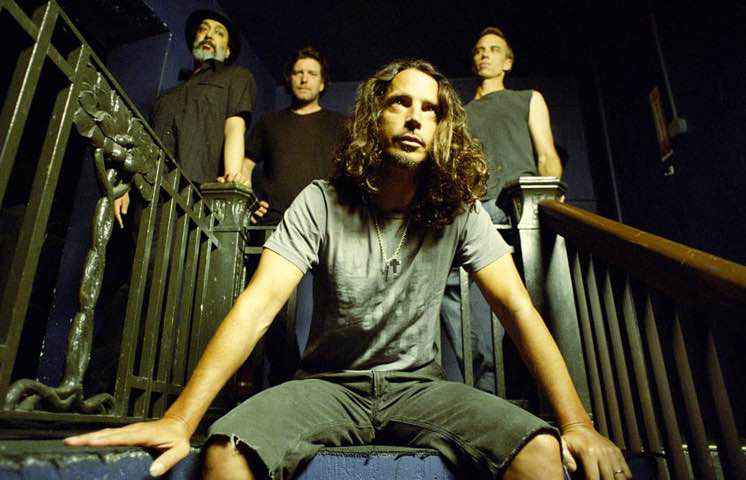Someone, via social media, criticised me for writing such a long piece about Kurt Cobain’s death and not saying anything about Layne Staley (who by strange twists of fate also died on April 5th, though eight years later).
The reason I wrote something about Kurt was because it was specifically the 20th year since his death, whereas Layne died twelve years ago, which doesn’t have the same resonance to it as a passage of time.
For the record, I did refer to Layne in the Kurt post. However, I’m saying a little more here about Layne’s passing too, as he was someone else I really had a huge amount of love for (and still do).
As a vocalist, Layne was second to none. I have never heard any other male singer with as powerful or as haunting a voice as Layne Staley’s.
He was probably the greatest singer of that generation of bands (though Chris Cornell would be the other contender), and I personally gravitate towards Layne’s singing and his voice more than any other singer from any period.
That guy’s voice could melt you in an instant; that guy’s voice could take an otherwise average or below-average song and transform it into something you can’t stop listening to. He could take an otherwise dry lyric and turn it into something that would resonate in spite of itself. He could make you cry. Could make the hairs on your skin stand on end.
Even now there are certain songs I can’t even listen to anymore, because the emotion evoked is just too strong; Rotten Apple, Down in a Hole, the breathtaking Mad Season track Wake Up, to name a few.
The poignant title-track from the reformed Alice in Chains first album ‘Black Gives Way To Blue‘ is also impossible to listen to for me, because it’s so clearly a song about Layne.
Even as an Alice in Chains fan, I always realised it was Layne’s singing that raised that band’s level; in my opinion Alice in Chains wouldn’t have been that great a band without him fronting it, because musically speaking it was never really about what was going on instrumentally – Alice in Chains has always been about the vocals, whether it was Staley’s solo vocals or the famous Staley/Cantrell harmonisation.
That was always the magic element that set that band apart and that the band’s music was raised up by.
I remember when he died; the night before I heard about it, I was at my ex-girlfriend’s house and I was playing her Jar of Flies on cassette tape, because she’d only heard Dirt at that point. The next day, I’d gone home and she phoned me and said “you know the guy’s who’s music you were playing me last night? He died, you know…”
I thought she was joking.

What was always curious to me about Layne’s death in 2002 was how quiet it was. The media didn’t really make much of it at all; radio stations, at least here in the UK (I don’t know about the US), along with mainstream papers and television, including MTV, hardly seemed to mark Staley’s passing, which I always found very, very disappointing.
As well as confusing – it’s not like Alice in Chains were some unheard-of band; they’d had albums sit at No.1 on the Billboard charts. I remember feeling quite annoyed at this lack of coverage – it felt like a snub.
Having said that, he wasn’t the first exceptionally talented rock musician of the time whose passing was under-appreciated; Shannon Hoon, frontman of Blind Melon, died of an overdose, aged 28, in 1995, and he had even less coverage than Staley. I’m amazed and disheartened to this day how many people I meet have never heard of Shannon Hoon.
The worst of this lack-of-reaction in the mainstream occurred at the MTV awards that year, which is attested to by Jerry Cantrell in an interview; that Layne’s death wasn’t commemorated at that ceremony, despite the fact that the death of soul singer Aaliyah was given a massive amount of coverage.
As much as it was an insult to Layne, it was also just as much an illustration of how much MTV’s focus had shifted in the years since Cobain’s death in 1994 – a point at which alt-rock bands, including Seattle bands, were being featured a lot on MTV’s rotations – to the death of Layne Staley in 2002, by which time MTV had become almost entirely dominated by mainstream hip-hop or pop-chart music and any traces of indie, alternative or rock had almost entirely vanished.
It’s sad actually; nowadays the only rock music you’ll tend to see on music stations is fucking awful post-grunge nonsense like Nickelback, Creed, Staind, and all the really terrible music that came after them or really bad, cheesy metal or Emo.
Getting back to the point, however, there are several reasons Layne Staley’s death in 2002 didn’t capture mainstream media attention in the way Cobain’s did.
The first is that Nirvana at the time Kurt died were a bigger commercial act than Alice in Chains were at the time of Staley’s death.
Cobain died while Nirvana were still at the height of their power and popularity – just eight months before he died, they were at No.1 on the album charts on both sides of the Atlantic. When Layne died, Alice in Chains hadn’t released a proper album for six years and Layne himself had hardly been musically active at all.
And in truth, though Alice in Chains have certainly influenced a huge number of other bands over the years, Nirvana without doubt were a bigger influence on rock music at the time and on the music industry in general for a few years.
To be perfectly honest, I resisted Alice in Chains for a while – I didn’t get into them until I properly listened to Dirt, having first heard Jar of Flies and been stunned by how good it was.
Prior to that I’d seen some of their videos, but I just thought they were an 80’s-style throwback who really weren’t punk at all but had more in common with Metallica than with alternative rock. But Alice in Chains evolved; they evolved constantly from album to album and got better and better.
And in any case, it wasn’t until I’d listened to Dirt properly that I realised how good a band they were and how incredible a singer Layne Staley was.
The second reason Layne’s death was under-covered was because the mainstream media loves soap stories and real-life dramas; Kurt’s life had been very dramatic, a lot of it played out in public, particularly with Courtney, and it had all happened in a very short amount of time – this meant there was a lot of media interest.
Whereas Layne, though the frontman of a very successful band, lived a quieter off-stage life and didn’t have all of that off-stage drama and interest from journalists.
_____________________
“Kurt and I weren’t the closest of friends, but I knew him well enough to be devastated by his death…” – Layne Staley.
_____________________
The third reason is because of the manner of death. Kurt died in a very remarkable, very shocking way, that made a massive impression not just on fans of his music but on pretty much everyone; this has been combined in the years since with conspiracy theories about his death.
Layne, on the other hand, died the almost classic rock-star death of a drug overdose, just like Jim Morrison, Jimi Hendrix, Janis Joplin, and others before him.

While just as sad, it wasn’t as unusual or shocking. It was, in fact, predictable; all too painfully predictable.
Layne’s demise, unlike Kurt’s, was long and drawn-out and in many ways even sadder than Kurt’s. Over the course of several years, he became a recluse, hidden away from the world, from everyone in his life, his heroin addiction getting worse and worse, his health deteriorating in various ways (some of them, according to rumours at the time, being too horrible to even think about).
Although it’s authenticity has been contested over the years, he allegedly told a journalist via telephone, “I know I’m near death. I didn’t want it to end this way.”
It’s numbing to think of someone so fucking talented, so brilliant, just locked away in a room, slowly wasting away to an abject and meaningless end. It depresses the hell out of me when I think about it. What’s also extraordinary, however, is how plenty of people saw it coming for a long time; and yet no one seemed to be able to do anything about it. Either people around him got complacent or Layne himself was just impossible to help.
But I distinctly remember an interview with Henry Rollins in a 1995 British music magazine basically saying he was so angry at Layne for wasting away his incredible talent by fucking himself up on heroin; Rollins, the former Black Flag frontman, was so big a fan of Staley that it hurt him to see what the guy was doing to himself.
This was a whole seven years before Layne’s death and Rollins could already see where it was going.
And yet a whole seven years later it just went and happened anyway; I mean seven years of possibilities for Layne to seek help or to be “saved” by his friends or family simply drifted by. OK, some people can’t be helped, some people are beyond help; I understand that. But Layne never seemed to actually have a ‘death wish’ like Kurt seemed to or like Richey Edwards from the Manic Street Preachers did, he simply seemed unable to pull himself back out of the abyss.
It has always upset me a great deal, thinking about how Layne died; and thinking about how it took two whole weeks for his body to even be discovered, his death to even be noticed. I mean it’s just mind-numbing to think that someone who sold millions of albums and meant that much to that many people could be unnoticed for two whole weeks.
Although highly respected in the rock community and of course adored by his fans, Staley is seen to have been highly neglected or sidelined by mainstream music journalism and popular culture.
However, in some ways this makes him all the more cooler for it. There is actually something beneficial in this neglect and it’s this: Layne Staley’s memory isn’t being hijacked or shat on over the years like Kurt‘s often is. There isn’t a lame-ass statue of Layne like there is of Kurt.
There isn’t going to be a Layne movie that fucks up his memory and there certainly isn’t going to be a Layne ‘musical’ (and I’m not joking – there is actually serious talk now doing the rounds about a possible Cobain musical).
By not being quite the total crossover superstar that Kurt was, Layne’s dignity is preserved better and his legacy remains an untainted musical one without all the bullshit baggage that Kurt’s legacy has unfortunately accumulated. If Kurt was worried enough in his own lifetime about how he and his band had become public property, the sad truth is they’ve become even more so after his death in 1994.
Layne, however, remains free of that.

Twelve years have passed since Layne Staley died that lonely, abject death; and I still get emotional when I linger on it.
It’s not just the sadness at having lost so unique and so great a talent and presence, it’s the fact that it simply shouldn’t have happened.
Again, unlike Kurt’s death, which was very quick, as far the outside world’s perception of it is concerned – Kurt’s entire career having been very quick, over in a flash – Layne’s slow demise seemed to drag on for so long that you just have to wonder why it couldn’t have been prevented, his problems dealt with.
There are plenty of rock stars who’ve had serious drug habits but managed over time to get clean – some of them are still alive today and have been going for decades.
For all the greatness of what Layne did give us, you can’t help but wonder how much more he could’ve given us if he’d been in decent health. Here was a singer who for the last eight years of his life barely did anything musically, after all.
He had instead become everything that Henry Rollins had desperately hoped he wouldn’t.
_____________________
“Drugs won’t lead to a fairy-tale life, they lead to suffering…” – Layne Staley.
_____________________
It’s easy to condemn the drug use and lament what drugs did to him, but if we’re going to be honest about it we have to also acknowledge the influence of drugs or drug-induced states had on the music that helped earn them their fanbase in the first place; no one can pretend the Dirt album wasn’t thematically about drug use and heavily influenced by it.
This isn’t meant as a criticism, by the way, only an observation; in that sense they were no different to Jim Morrison and The Doors, who were also open about the use and influence of drugs on their music. And Morrison, like Staley, ended up a victim of those same influences.
In any case, Layne’s stature and reputation has been growing steadily for years by now, with all kinds of people who never knew Alice in Chains at the time nevertheless coming to appreciate that band’s music and Layne’s incredible contribution. There are kids today who weren’t born yet when the original Alice in Chains line-up was doing its thing, but who have become zealous fans; I guess in the same way I was able to become a Jim Morrison or Jimi Hendrix fan even though I wasn’t born when they were around.
So Layne Staley’s star will continue to shine brightly far, far beyond his lifetime; which is something you dream about as a rock musician.
However, as a fan, I just wish he’d stayed around a lot longer.
What he did give us, however, in his short career was plenty; and will be with us forever, and I’m sure will be just as powerful twenty years from now as it is today or as it was twenty years ago.
Read more: ‘Chris Cornell’s Interview on Life, Death, Reality & His Dream of Layne Staley‘, ‘MAD SEASON’S ‘Above‘ – One Magic, Special Moment in Time‘, ‘ALICE IN CHAINS: 20-Year Reflection on Layne’s Last Album‘, ‘Remembering the Otherworldly Shannon Hoon’, ‘Mourning CHRIS CORNELL – A Sad Ode to His Power & Our Gift‘…





Some things in here are so opinionated that it’s sickening. There are MANY who will tell u AIC had as big or bigger an influence on rock as Nirvana did. And when u say AIC rode Nirvanas momentum….Facelift was released a year before Teen Spirit. Layne Staley not have enough to compile a large article? I could damn near write a whole novel on him without cracking open a single source.
Nirvana=noise
AIC=grunge
Most Seattle bands early 90’s would say they played grunge. Alice in Chains, fronted by the incomparable LS, WAS grunge. No comparison.
I don’t know what you’re taking exception to – given that I said from the outset that I thought Layne was the best singer, bar none. But I was just saying that EVERY grunge/alternative band from late 91 onwards was basically riding Nirvana’s momentum – that’s not an insult to those bands. I love Alice in Chains. But Nirvana breaking through in commercial terms created the momentum for those other bands to break into mainstream coverage and attention: I’m talking in terms of mainstream coverage and attention, NOT in terms of the music itself.
But anyone who thinks Nirvana is just ‘noise’ has lost the plot.
First time on your blog, I know very little about layne staley but, I have to say you wrote a excellent piece.
Thanks very much, Christine Mills. I hope maybe it encourages you to seek out more of his music. Thanks for visiting – and for commenting.
I find it curious that you didn’t note the death of Layne Staley’s ex fiance, Demri Parrott. From articles I’ve read, it seems her death was at least one reason why his drug use got so bad in the end. It broke him. This is worth noting, because I believe it was a major contribution to his demise.
That’s a good point, Samantha, and you’re probably right.
Brilliant article!